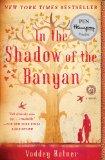Summary | Excerpt | Reading Guide | Discuss | Reviews | Beyond the Book | Readalikes | Genres & Themes | Author Bio

A Novel
by Vaddey RatnerOne
War entered my childhood world not with the blasts of rockets and bombs but with my father's footsteps as he walked through the hallway, passing my bedroom toward his. I heard the door open and shut with a soft click. I slid off my bed, careful not to wake Radana in her crib, and snuck out of my room. I pressed my ear to the door and listened.
"Are you all right?" Mama sounded concerned.
Each day before dawn, Papa would go out for a solitary stroll, and returning an hour or so later, he would bring back with him the sights and sounds of the city, from which would emerge the poems he read aloud to me. This morning, though, it seemed he came back as soon as he'd stepped out, for dawn had just arrived and the feel of night had yet to dissipate. Silence trailed his every step like the remnant of a dream long after waking. I imagined him lying next to Mama now, his eyes closed as he listened to her voice, the comfort it gave him amidst the clamor of his own thoughts.
"Nothing, darling," Papa said.
"What is it?" she persisted.
A deep, long sigh, then finally he said, "The streets are filled with people, Aana. Homeless, hungry, desperate . . ." He paused, the bed creaked, and I imagined him turning to face her, their cheeks on the same long pillow, as I'd often seen. "The miseries - "
"No matter what awfulness is out there," Mama cut in gently, "I know you will take care of us."
A breathless silence. I imagined her lips pressed against his. I blushed.
"There!" she exclaimed, the insouciant ring and chime of her voice returning. Then came the sound of slatted shutters being opened, like wooden birds released, suddenly taking flight. "The sun is brilliant!" she enthused, and with these easy words chased away the morning's gravity, threw "Nothing" back out the gates like a stray cat that had clawed its way onto Papa's shoulder.
A shaft of light fell on the front of the house and spilled into the open hallway from the balcony. I imagined it a celestial carpet thrown from the heavens by a careless tevoda - an angel. I ran toward it, my steps unencumbered by the metal brace and shoes I normally wore to correct the limp in my right leg.
Outside, the sun rose through the luxuriant green foliage of the courtyard. It yawned and stretched, like an infant deity poking its long multiple arms through the leaves and branches. It was April, the tail end of the dry season, and it was only a matter of time before the monsoon arrived, bringing with it rains and relief from the heat and humidity. Meanwhile the whole house was hot and stuffy, like the inside of a balloon. I was slick with sweat. Still, New Year was coming, and after all the waiting and wondering, we'd finally have a celebration!
"Up, up, up!" came a cry from the cooking pavilion. It was Om Bao, her voice as voluminous as her ample figure, which resembled an overstuffed burlap rice sack.
"Pick up your lazy heads!" she clucked urgently. "Hurry, hurry, hurry!"
I ran around the balcony to the side of the house and saw her roll back and forth between the women's lower house and the cooking pavilion, her sandals smacking the dirt with impatience. "Wash your faces, brush your teeth!" she ordered, clapping as she chased a row of sleepy servant girls to the clay vats lining the wall outside the cooking pavilion. "Oey, oey, oey, the sun has risen and so should your behinds!" She whacked one of the girls on the bottom. "You'll miss the Tiger's last roar and the Rabbit's first hop!"
The Tiger and the Rabbit were lunar years, one ending and the other beginning. Khmer New Year is always celebrated in April, and this year - 1975 - it was to fall on the seventeenth, just a few days away. In our house, preparations would customarily begin long in advance for all the Buddhist ceremonies and garden parties thrown during the celebration. This year, because of the fighting, Papa didn't want us to celebrate. New Year was a time of cleansing, he reminded us, a time of renewal. And as long as there was fighting in the countryside, driving refugees into our city streets, it would be wrong for us to be celebrating anything. Fortunately, Mama disagreed. If there was a time to celebrate, she argued, it was now. A New Year's party would chase away all that was bad and usher in all that was good.
Excerpted from In the Shadow of the Banyan by Vaddey Ratner. Copyright © 2012 by Vaddey Ratner. Reprinted by permission of Simon & Schuster, Inc, NY.
There are two kinds of people in the world: those who divide the world into two kinds of people, and those who don'...
Click Here to find out who said this, as well as discovering other famous literary quotes!
Your guide toexceptional books
BookBrowse seeks out and recommends the best in contemporary fiction and nonfiction—books that not only engage and entertain but also deepen our understanding of ourselves and the world around us.